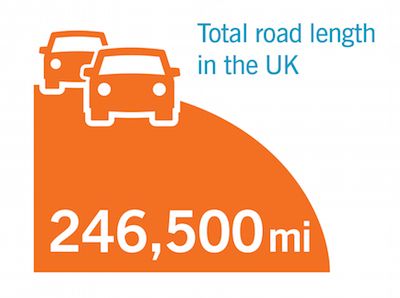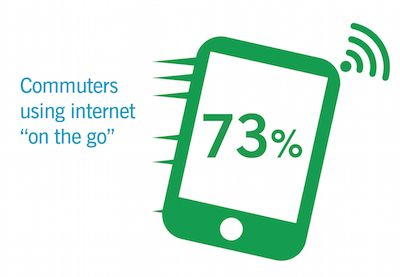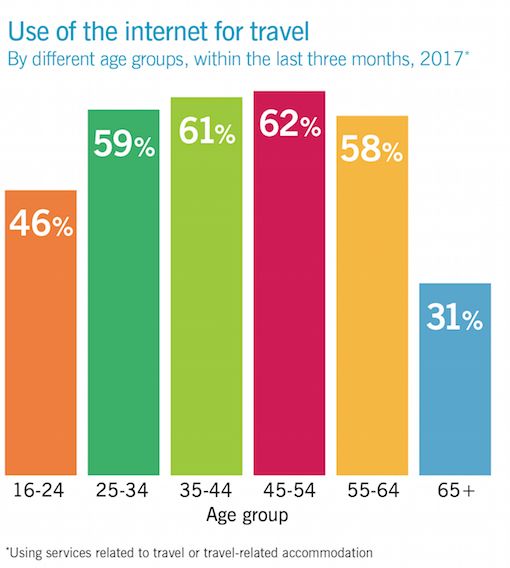Click here to see a map of data projects around the UK
There is an increasing recognition that data underpins the evolution of our transport systems and our travel behaviours. Almost three quarters (73 per cent) of adults in the UK routinely access the internet through their mobile devices and we are openly accustomed to relying on the internet when making travel-related decisions.
Furthermore, regions throughout the UK are now facing traffic and rail commuting volumes which have grown exponentially over the past few decades, resulting in a transport network which is near the limit of its capacity. However, beyond identifying and remedying overburdened transport connections, addressing our diverse transport needs requires taking into account cultural and geographical realities.
Data can be key to understanding these realities. However, data does not exist within a vacuum. Removing barriers of access to data requires forming partnerships across multiple sectors that remain credible while ensuring that collected data can be used to fulfill policy and infrastructure priorities. Effectively, for smart cities to develop successfully, key questions about data need to be addressed within their regional context rather than in isolation of it.
As shown opposite, the development of city-wide and regional data platforms highlight how improving access to data and addressing system fragmentation can enable smart city planning and add value to infrastructure. The challenge remains in ensuring that these new systems and ventures develop in a financially, technologically and systematically resilient manner.
On the 3rd of October, Prospect launched Data as Infrastructure. This special report grew out of a series of high-level roundtable meetings over the summer which brought together government, private businesses and the third sector to look at how data is already being used to improve people’s lives and how it has the potential to do so much more.
To find out more about how you can become involved in Prospect’s thought leadership programmes, please contact saskia.abdoh@prospect-magazine.co.uk.
You can also download the whole Data as Infrastructure supplement as a fully designed PDF document. To do so, simply enter your email below. You’ll receive your copy completely free—within minutes.
[prosform fields="email,forename,surname" signupcode="Data" countrycode="GB" redirect="data-as-infrastructure-is-yours"]
When you sign up for this free report, you will also join our free Prospect newsletter.
Prospect takes your privacy seriously. We promise never to rent or sell your e-mail address to any third party. You can unsubscribe from the Prospect newsletter at any time
There is an increasing recognition that data underpins the evolution of our transport systems and our travel behaviours. Almost three quarters (73 per cent) of adults in the UK routinely access the internet through their mobile devices and we are openly accustomed to relying on the internet when making travel-related decisions.
Furthermore, regions throughout the UK are now facing traffic and rail commuting volumes which have grown exponentially over the past few decades, resulting in a transport network which is near the limit of its capacity. However, beyond identifying and remedying overburdened transport connections, addressing our diverse transport needs requires taking into account cultural and geographical realities.
Data can be key to understanding these realities. However, data does not exist within a vacuum. Removing barriers of access to data requires forming partnerships across multiple sectors that remain credible while ensuring that collected data can be used to fulfill policy and infrastructure priorities. Effectively, for smart cities to develop successfully, key questions about data need to be addressed within their regional context rather than in isolation of it.
As shown opposite, the development of city-wide and regional data platforms highlight how improving access to data and addressing system fragmentation can enable smart city planning and add value to infrastructure. The challenge remains in ensuring that these new systems and ventures develop in a financially, technologically and systematically resilient manner.



On the 3rd of October, Prospect launched Data as Infrastructure. This special report grew out of a series of high-level roundtable meetings over the summer which brought together government, private businesses and the third sector to look at how data is already being used to improve people’s lives and how it has the potential to do so much more.
To find out more about how you can become involved in Prospect’s thought leadership programmes, please contact saskia.abdoh@prospect-magazine.co.uk.
You can also download the whole Data as Infrastructure supplement as a fully designed PDF document. To do so, simply enter your email below. You’ll receive your copy completely free—within minutes.
[prosform fields="email,forename,surname" signupcode="Data" countrycode="GB" redirect="data-as-infrastructure-is-yours"]
When you sign up for this free report, you will also join our free Prospect newsletter.
Prospect takes your privacy seriously. We promise never to rent or sell your e-mail address to any third party. You can unsubscribe from the Prospect newsletter at any time













